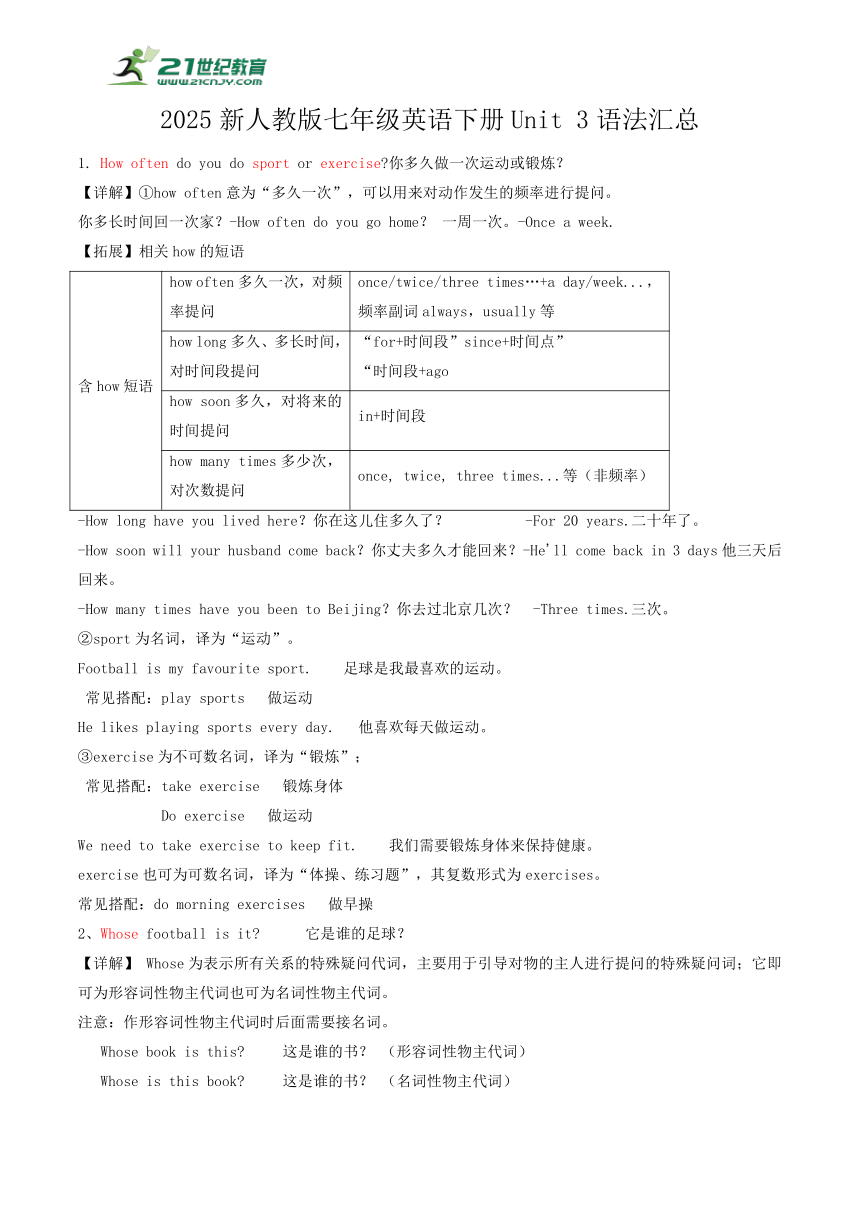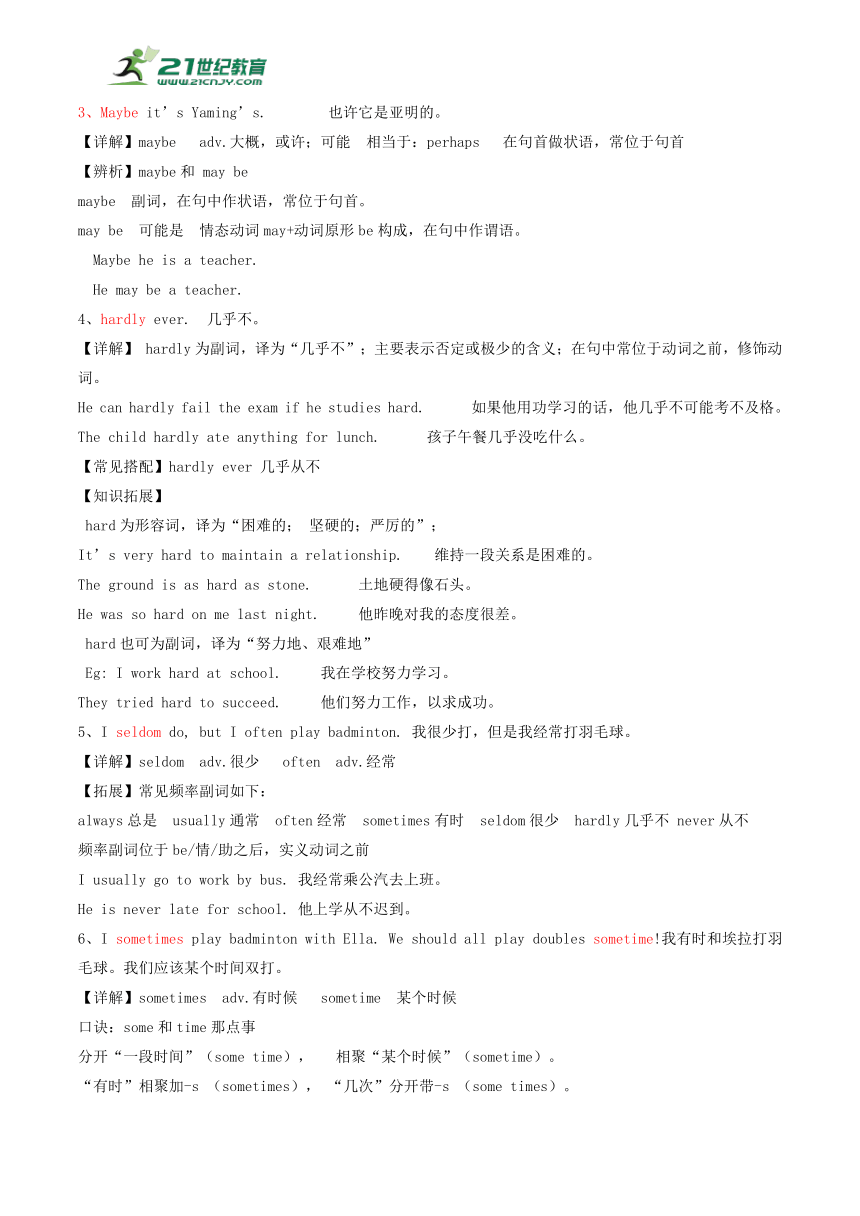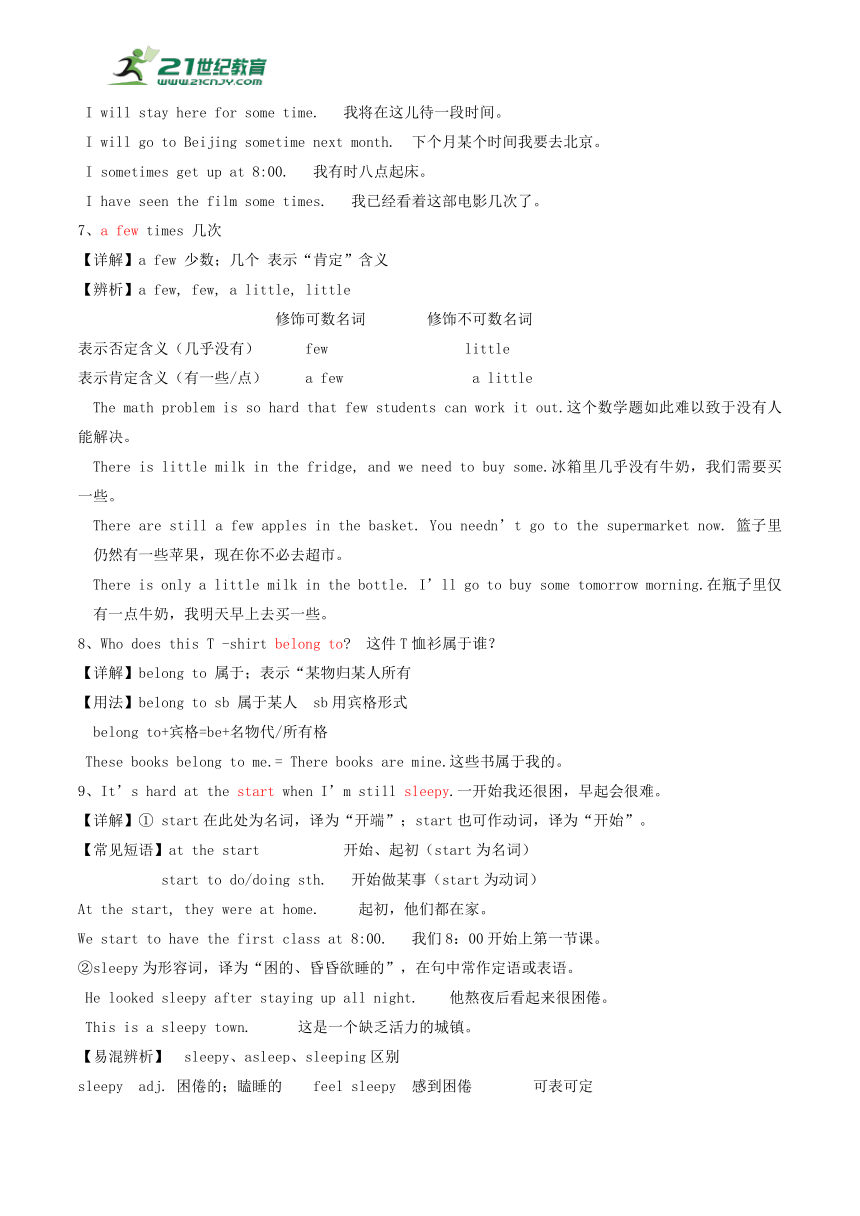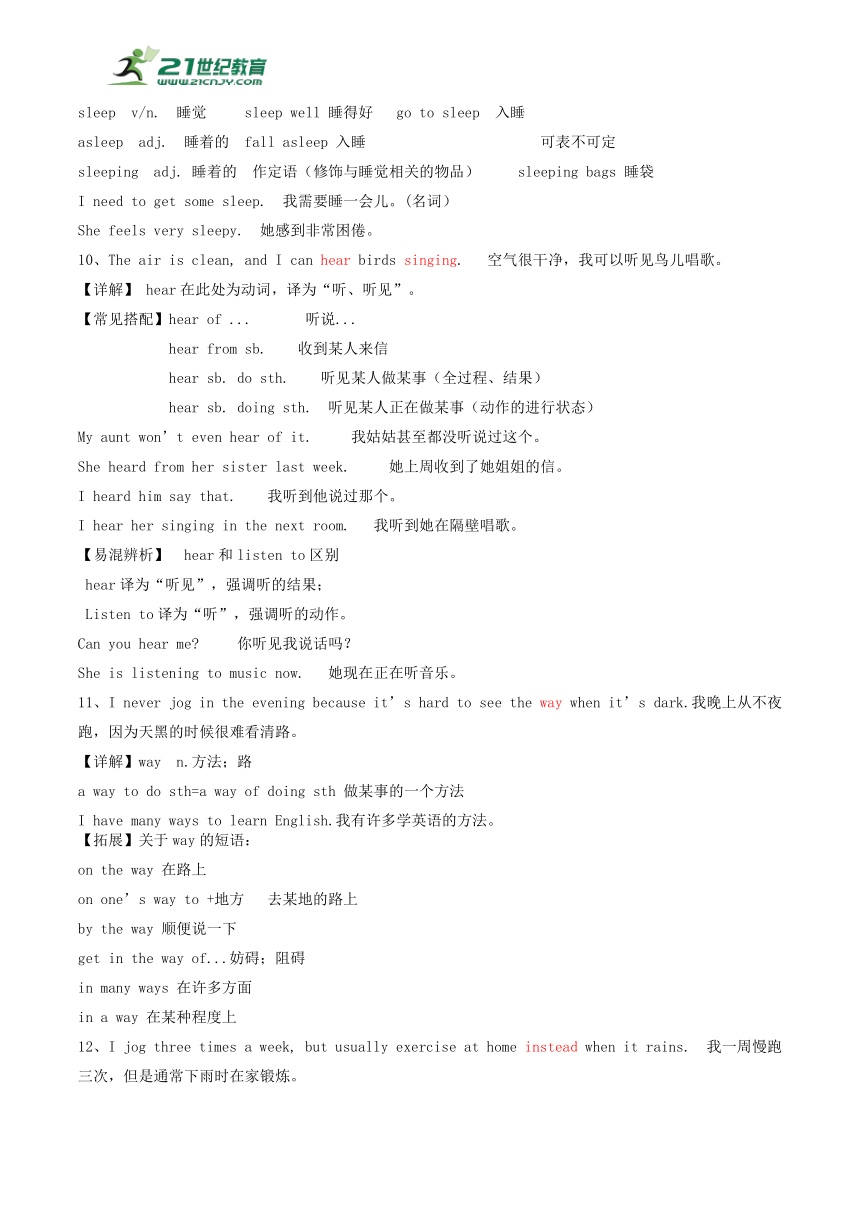Unit 3 Keep Fit 语法汇总学案-2025新人教版七年级英语下册
文档属性
| 名称 | Unit 3 Keep Fit 语法汇总学案-2025新人教版七年级英语下册 |

|
|
| 格式 | docx | ||
| 文件大小 | 77.2KB | ||
| 资源类型 | 试卷 | ||
| 版本资源 | 人教版 | ||
| 科目 | 英语 | ||
| 更新时间 | 2025-01-11 08:39:40 | ||
图片预览




文档简介
2025新人教版七年级英语下册Unit 3语法汇总
How often do you do sport or exercise 你多久做一次运动或锻炼?
【详解】①how often意为“多久一次”,可以用来对动作发生的频率进行提问。
你多长时间回一次家?-How often do you go home? 一周一次。-Once a week.
【拓展】相关how的短语
含how短语 how often多久一次,对频率提问 once/twice/three times…+a day/week...,频率副词always,usually等
how long多久、多长时间,对时间段提问 “for+时间段”since+时间点” “时间段+ago
how soon多久,对将来的时间提问 in+时间段
how many times多少次,对次数提问 once, twice, three times...等(非频率)
-How long have you lived here?你在这儿住多久了? -For 20 years.二十年了。
-How soon will your husband come back?你丈夫多久才能回来?-He'll come back in 3 days他三天后回来。
-How many times have you been to Beijing?你去过北京几次? -Three times.三次。
②sport为名词,译为“运动”。
Football is my favourite sport. 足球是我最喜欢的运动。
常见搭配:play sports 做运动
He likes playing sports every day. 他喜欢每天做运动。
③exercise为不可数名词,译为“锻炼”;
常见搭配:take exercise 锻炼身体
Do exercise 做运动
We need to take exercise to keep fit. 我们需要锻炼身体来保持健康。
exercise也可为可数名词,译为“体操、练习题”,其复数形式为exercises。
常见搭配:do morning exercises 做早操
2、Whose football is it 它是谁的足球?
【详解】 Whose为表示所有关系的特殊疑问代词,主要用于引导对物的主人进行提问的特殊疑问词;它即可为形容词性物主代词也可为名词性物主代词。
注意:作形容词性物主代词时后面需要接名词。
Whose book is this 这是谁的书? (形容词性物主代词)
Whose is this book 这是谁的书? (名词性物主代词)
3、Maybe it’s Yaming’s. 也许它是亚明的。
【详解】maybe adv.大概,或许;可能 相当于:perhaps 在句首做状语,常位于句首
【辨析】maybe和 may be
maybe 副词,在句中作状语,常位于句首。
may be 可能是 情态动词may+动词原形be构成,在句中作谓语。
Maybe he is a teacher.
He may be a teacher.
4、hardly ever. 几乎不。
【详解】 hardly为副词,译为“几乎不”;主要表示否定或极少的含义;在句中常位于动词之前,修饰动词。
He can hardly fail the exam if he studies hard. 如果他用功学习的话,他几乎不可能考不及格。
The child hardly ate anything for lunch. 孩子午餐几乎没吃什么。
【常见搭配】hardly ever 几乎从不
【知识拓展】
hard为形容词,译为“困难的; 坚硬的;严厉的”;
It’s very hard to maintain a relationship. 维持一段关系是困难的。
The ground is as hard as stone. 土地硬得像石头。
He was so hard on me last night. 他昨晚对我的态度很差。
hard也可为副词,译为“努力地、艰难地”
Eg: I work hard at school. 我在学校努力学习。
They tried hard to succeed. 他们努力工作,以求成功。
5、I seldom do, but I often play badminton. 我很少打,但是我经常打羽毛球。
【详解】seldom adv.很少 often adv.经常
【拓展】常见频率副词如下:
always总是 usually通常 often经常 sometimes有时 seldom很少 hardly几乎不 never从不
频率副词位于be/情/助之后,实义动词之前
I usually go to work by bus. 我经常乘公汽去上班。
He is never late for school. 他上学从不迟到。
6、I sometimes play badminton with Ella. We should all play doubles sometime!我有时和埃拉打羽毛球。我们应该某个时间双打。
【详解】sometimes adv.有时候 sometime 某个时候
口诀:some和time那点事
分开“一段时间”(some time), 相聚“某个时候”(sometime)。
“有时”相聚加-s (sometimes), “几次”分开带-s (some times)。
I will stay here for some time. 我将在这儿待一段时间。
I will go to Beijing sometime next month. 下个月某个时间我要去北京。
I sometimes get up at 8:00. 我有时八点起床。
I have seen the film some times. 我已经看着这部电影几次了。
7、a few times 几次
【详解】a few 少数;几个 表示“肯定”含义
【辨析】a few, few, a little, little
修饰可数名词 修饰不可数名词
表示否定含义(几乎没有) few little
表示肯定含义(有一些/点) a few a little
The math problem is so hard that few students can work it out.这个数学题如此难以致于没有人能解决。
There is little milk in the fridge, and we need to buy some.冰箱里几乎没有牛奶,我们需要买一些。
There are still a few apples in the basket. You needn’t go to the supermarket now. 篮子里仍然有一些苹果,现在你不必去超市。
There is only a little milk in the bottle. I’ll go to buy some tomorrow morning.在瓶子里仅有一点牛奶,我明天早上去买一些。
8、Who does this T -shirt belong to 这件T恤衫属于谁?
【详解】belong to 属于;表示“某物归某人所有
【用法】belong to sb 属于某人 sb用宾格形式
belong to+宾格=be+名物代/所有格
These books belong to me.= There books are mine.这些书属于我的。
9、It’s hard at the start when I’m still sleepy.一开始我还很困,早起会很难。
【详解】① start在此处为名词,译为“开端”;start也可作动词,译为“开始”。
【常见短语】at the start 开始、起初(start为名词)
start to do/doing sth. 开始做某事(start为动词)
At the start, they were at home. 起初,他们都在家。
We start to have the first class at 8:00. 我们8:00开始上第一节课。
②sleepy为形容词,译为“困的、昏昏欲睡的”,在句中常作定语或表语。
He looked sleepy after staying up all night. 他熬夜后看起来很困倦。
This is a sleepy town. 这是一个缺乏活力的城镇。
【易混辨析】 sleepy、asleep、sleeping区别
sleepy adj. 困倦的;瞌睡的 feel sleepy 感到困倦 可表可定
sleep v/n. 睡觉 sleep well 睡得好 go to sleep 入睡
asleep adj. 睡着的 fall asleep 入睡 可表不可定
sleeping adj. 睡着的 作定语(修饰与睡觉相关的物品) sleeping bags 睡袋
I need to get some sleep. 我需要睡一会儿。(名词)
She feels very sleepy. 她感到非常困倦。
10、The air is clean, and I can hear birds singing. 空气很干净,我可以听见鸟儿唱歌。
【详解】 hear在此处为动词,译为“听、听见”。
【常见搭配】hear of ... 听说...
hear from sb. 收到某人来信
hear sb. do sth. 听见某人做某事(全过程、结果)
hear sb. doing sth. 听见某人正在做某事(动作的进行状态)
My aunt won’t even hear of it. 我姑姑甚至都没听说过这个。
She heard from her sister last week. 她上周收到了她姐姐的信。
I heard him say that. 我听到他说过那个。
I hear her singing in the next room. 我听到她在隔壁唱歌。
【易混辨析】 hear和listen to区别
hear译为“听见”,强调听的结果;
Listen to译为“听”,强调听的动作。
Can you hear me 你听见我说话吗?
She is listening to music now. 她现在正在听音乐。
11、I never jog in the evening because it’s hard to see the way when it’s dark.我晚上从不夜跑,因为天黑的时候很难看清路。
【详解】way n.方法;路
a way to do sth=a way of doing sth 做某事的一个方法
I have many ways to learn English.我有许多学英语的方法。
【拓展】关于way的短语:
on the way 在路上
on one’s way to +地方 去某地的路上
by the way 顺便说一下
get in the way of...妨碍;阻碍
in many ways 在许多方面
in a way 在某种程度上
12、I jog three times a week, but usually exercise at home instead when it rains. 我一周慢跑三次,但是通常下雨时在家锻炼。
【详解】 instead和instead of区别
instead为副词,在顺接句子中表示“代替”,在转折句子中表示“然而”,通常位于句首或句末。
They didn’t meet her, they met her cousin instead. 他们没有遇到她,而是遇到了她的表姐。
instead of为介词短语,后面常跟名词、代词或动名词,表示“代替;而不是”。
He drank some coffee instead of tea. 他没有和咖啡,而是喝了一些茶。
13、My skateboard is really cool, and so are theirs. 我的滑板真的很酷,他们的也是。
【详解】①结构“so + 倒装语序”,即 “so + 助动词/ be动词/ 情态动词 + 主语”,译为“.…..也是”;主语指不同的人
--He can play the piano. -- So can I . -- 他会弹钢琴。 -- 我也会。
②结构“so + 陈述语序”,即“so + 主语 + 助动词/ be动词/ 情态动词”,译为“.…..的确如此”; 主语指相同的人。
--He always studies hard. -- So he does. -- 他一直学习努力。 -- 他确实如此。
【知识拓展】
结构“neither/ nor + 倒装语序”,译为“.…..也不”。
注意:前句必须为否定句。
--They aren’t from America. -- Neither am I . -- 他们不是来自美国。 -- 我也不是。
14、We encourage one another to do tricks. 我们互相鼓励做花样。
【详解】①encourage为动词,译为“鼓励”。
常见搭配:encourage sb. to do sth. 鼓励某人做某事
The teacher encouraged the students to believe in themselves. 老师鼓励学生相信自己。
②trick n.花招;把戏;技巧
do tricks 耍花招 play tricks on sb 捉弄某人
It is wrong to play tricks on the people with disability. 捉弄残疾人是错误的。
15、Some tricks are difficult, but once you succeed, you feel great!一些花样很难,但是一旦你成功,你感觉很棒!
【详解】① once 一旦;曾经;一次
at once 立刻 once again 再一次 once in a while有时
②Succeed为动词,译为“成功、继承”,其名词形式为“success”,形容词形式为“successful”;副词形式为“successfully”。
His plan succeeded. 他的计划成功了。
Confidence is the key to success. 信心是成功的关键。
She is a successful actress. 她是一名成功的演员。
【常见搭配】succeed in doing sth成功做某事
He succeed in passing the exam. 他成功地通过了考试。
16、It can show my progress. 它展示我的进步。
【详解】①show在此处为动词,译为“展示”,也可为动词,译为“表演”。
【常见搭配】show sb. sth. = show sth. to sb. 给某人看某物
Please show me that photo. = Please show that photo to me. 请给我看看那张照片。
Magic show. 魔术表演。
②progress n.进步(不可数名词) make progress in...在某方面取得进步
【拓展】 progress v.进步;进展
The course allows students to progress at their own speed.本课程允许学生按各自的速度学习。
17、We work as s team, and we win or lose as a team. 我们作为一个团队工作,我们作为一支队伍论输赢。
【详解】win动词 获胜、赢
【拓展】win/ beat/lose区别
“win”、“beat”和“lose”这三个词在英语中都与胜负有关,但它们的用法和侧重点有所不同。
“beat”(打败),后面跟“人”,
Class Three beat us 5-0. 三班以5∶0打败了我们。
“win”(赢得),后面跟“比赛、竞赛等”,
I am sure to win the match. 我一定能赢得比赛。
“lose”则表示“输了”,常用句型:lose sth. to sb.,
Unluckily we lost the match to Class Three. 不幸的是我们比赛输给了三班。
单元语法
物主代词
物主代词表示所有关系的代词,是人称代词的属格形式。
(一)分类
分为形容词性物主代词和名词性物主代词。
形容词性物主代词:
my我的;your你的;his他的; her她的; its它的; our我们的; your你们的; their他们的
名词性物主代词:
mine我的; yours你的; his 他的; hers 她的; its它的; ours 我们的; yours 你们的; theirs 他们的
(二)用法
形容词性物主代词具有形容词的特性,在句中作定语,后面接名词。
名词性物主代词具有名词的特性,后面不可再接名词,在句中作主语、表语或宾语。
(1) This is my book. = This book is mine. 这是我的书。
(2)--Is this pencil yours or hers -- It’s mine. Hers (= her pencil) is in her bag.
-- 这支铅笔是你的还是她的? -- 是我的。她的在她的包里。
名词性物主代词主语时,谓语动词的数随所指代的人或物的数而定。
-- Whose books are these
-- They are his. Yours are over there.
频度副词
频度副词的定义:
表示动作或状态出现的频率的副 词叫做频率或频度副词。
2.常见表示频率的副词有以下几个,它们的频率由高 到低依次为:
3.频度副词在句中的位置:
频率副词在句中常位于be动词、助动词、情态动词 之后,实义动词之前。sometimes有时可位于句首 或句末。
I am always busy with my work.我总是忙于我的工作。
Susan doesn't usually eat breakfast at school.苏姗 在学校通常不吃早饭。
He sometimes gets up at 5: 30. = Sometimes he gets up at 5:30.他有时 5:30 起床。
4.表示频率的短语有:
once/twice a week 一周一次/两次
three times a day 一天三次
every day/week/year每天/每星期/每年。
【温馨提示】三次或三次以上一般用“基数词+ times” 来表示。
5.当对频度副词及表示事件发生频率的短语提问时, 常用how often,意为“多久一次
-How often does Lisa go to the movies 莉萨多久 看一次电影?
一Never.从不。
6.频率副词或短语常与一般现在时态连用。
-I never eat meat.我从不吃肉。
-Jim usually does his homework in the evening.吉姆通常晚上做作业。
-Sally doesn't often watch TV at the weekend.莎莉 周末不常看电视。
-How often do you eat fruit 你多久吃一^次水果
How often do you do sport or exercise 你多久做一次运动或锻炼?
【详解】①how often意为“多久一次”,可以用来对动作发生的频率进行提问。
你多长时间回一次家?-How often do you go home? 一周一次。-Once a week.
【拓展】相关how的短语
含how短语 how often多久一次,对频率提问 once/twice/three times…+a day/week...,频率副词always,usually等
how long多久、多长时间,对时间段提问 “for+时间段”since+时间点” “时间段+ago
how soon多久,对将来的时间提问 in+时间段
how many times多少次,对次数提问 once, twice, three times...等(非频率)
-How long have you lived here?你在这儿住多久了? -For 20 years.二十年了。
-How soon will your husband come back?你丈夫多久才能回来?-He'll come back in 3 days他三天后回来。
-How many times have you been to Beijing?你去过北京几次? -Three times.三次。
②sport为名词,译为“运动”。
Football is my favourite sport. 足球是我最喜欢的运动。
常见搭配:play sports 做运动
He likes playing sports every day. 他喜欢每天做运动。
③exercise为不可数名词,译为“锻炼”;
常见搭配:take exercise 锻炼身体
Do exercise 做运动
We need to take exercise to keep fit. 我们需要锻炼身体来保持健康。
exercise也可为可数名词,译为“体操、练习题”,其复数形式为exercises。
常见搭配:do morning exercises 做早操
2、Whose football is it 它是谁的足球?
【详解】 Whose为表示所有关系的特殊疑问代词,主要用于引导对物的主人进行提问的特殊疑问词;它即可为形容词性物主代词也可为名词性物主代词。
注意:作形容词性物主代词时后面需要接名词。
Whose book is this 这是谁的书? (形容词性物主代词)
Whose is this book 这是谁的书? (名词性物主代词)
3、Maybe it’s Yaming’s. 也许它是亚明的。
【详解】maybe adv.大概,或许;可能 相当于:perhaps 在句首做状语,常位于句首
【辨析】maybe和 may be
maybe 副词,在句中作状语,常位于句首。
may be 可能是 情态动词may+动词原形be构成,在句中作谓语。
Maybe he is a teacher.
He may be a teacher.
4、hardly ever. 几乎不。
【详解】 hardly为副词,译为“几乎不”;主要表示否定或极少的含义;在句中常位于动词之前,修饰动词。
He can hardly fail the exam if he studies hard. 如果他用功学习的话,他几乎不可能考不及格。
The child hardly ate anything for lunch. 孩子午餐几乎没吃什么。
【常见搭配】hardly ever 几乎从不
【知识拓展】
hard为形容词,译为“困难的; 坚硬的;严厉的”;
It’s very hard to maintain a relationship. 维持一段关系是困难的。
The ground is as hard as stone. 土地硬得像石头。
He was so hard on me last night. 他昨晚对我的态度很差。
hard也可为副词,译为“努力地、艰难地”
Eg: I work hard at school. 我在学校努力学习。
They tried hard to succeed. 他们努力工作,以求成功。
5、I seldom do, but I often play badminton. 我很少打,但是我经常打羽毛球。
【详解】seldom adv.很少 often adv.经常
【拓展】常见频率副词如下:
always总是 usually通常 often经常 sometimes有时 seldom很少 hardly几乎不 never从不
频率副词位于be/情/助之后,实义动词之前
I usually go to work by bus. 我经常乘公汽去上班。
He is never late for school. 他上学从不迟到。
6、I sometimes play badminton with Ella. We should all play doubles sometime!我有时和埃拉打羽毛球。我们应该某个时间双打。
【详解】sometimes adv.有时候 sometime 某个时候
口诀:some和time那点事
分开“一段时间”(some time), 相聚“某个时候”(sometime)。
“有时”相聚加-s (sometimes), “几次”分开带-s (some times)。
I will stay here for some time. 我将在这儿待一段时间。
I will go to Beijing sometime next month. 下个月某个时间我要去北京。
I sometimes get up at 8:00. 我有时八点起床。
I have seen the film some times. 我已经看着这部电影几次了。
7、a few times 几次
【详解】a few 少数;几个 表示“肯定”含义
【辨析】a few, few, a little, little
修饰可数名词 修饰不可数名词
表示否定含义(几乎没有) few little
表示肯定含义(有一些/点) a few a little
The math problem is so hard that few students can work it out.这个数学题如此难以致于没有人能解决。
There is little milk in the fridge, and we need to buy some.冰箱里几乎没有牛奶,我们需要买一些。
There are still a few apples in the basket. You needn’t go to the supermarket now. 篮子里仍然有一些苹果,现在你不必去超市。
There is only a little milk in the bottle. I’ll go to buy some tomorrow morning.在瓶子里仅有一点牛奶,我明天早上去买一些。
8、Who does this T -shirt belong to 这件T恤衫属于谁?
【详解】belong to 属于;表示“某物归某人所有
【用法】belong to sb 属于某人 sb用宾格形式
belong to+宾格=be+名物代/所有格
These books belong to me.= There books are mine.这些书属于我的。
9、It’s hard at the start when I’m still sleepy.一开始我还很困,早起会很难。
【详解】① start在此处为名词,译为“开端”;start也可作动词,译为“开始”。
【常见短语】at the start 开始、起初(start为名词)
start to do/doing sth. 开始做某事(start为动词)
At the start, they were at home. 起初,他们都在家。
We start to have the first class at 8:00. 我们8:00开始上第一节课。
②sleepy为形容词,译为“困的、昏昏欲睡的”,在句中常作定语或表语。
He looked sleepy after staying up all night. 他熬夜后看起来很困倦。
This is a sleepy town. 这是一个缺乏活力的城镇。
【易混辨析】 sleepy、asleep、sleeping区别
sleepy adj. 困倦的;瞌睡的 feel sleepy 感到困倦 可表可定
sleep v/n. 睡觉 sleep well 睡得好 go to sleep 入睡
asleep adj. 睡着的 fall asleep 入睡 可表不可定
sleeping adj. 睡着的 作定语(修饰与睡觉相关的物品) sleeping bags 睡袋
I need to get some sleep. 我需要睡一会儿。(名词)
She feels very sleepy. 她感到非常困倦。
10、The air is clean, and I can hear birds singing. 空气很干净,我可以听见鸟儿唱歌。
【详解】 hear在此处为动词,译为“听、听见”。
【常见搭配】hear of ... 听说...
hear from sb. 收到某人来信
hear sb. do sth. 听见某人做某事(全过程、结果)
hear sb. doing sth. 听见某人正在做某事(动作的进行状态)
My aunt won’t even hear of it. 我姑姑甚至都没听说过这个。
She heard from her sister last week. 她上周收到了她姐姐的信。
I heard him say that. 我听到他说过那个。
I hear her singing in the next room. 我听到她在隔壁唱歌。
【易混辨析】 hear和listen to区别
hear译为“听见”,强调听的结果;
Listen to译为“听”,强调听的动作。
Can you hear me 你听见我说话吗?
She is listening to music now. 她现在正在听音乐。
11、I never jog in the evening because it’s hard to see the way when it’s dark.我晚上从不夜跑,因为天黑的时候很难看清路。
【详解】way n.方法;路
a way to do sth=a way of doing sth 做某事的一个方法
I have many ways to learn English.我有许多学英语的方法。
【拓展】关于way的短语:
on the way 在路上
on one’s way to +地方 去某地的路上
by the way 顺便说一下
get in the way of...妨碍;阻碍
in many ways 在许多方面
in a way 在某种程度上
12、I jog three times a week, but usually exercise at home instead when it rains. 我一周慢跑三次,但是通常下雨时在家锻炼。
【详解】 instead和instead of区别
instead为副词,在顺接句子中表示“代替”,在转折句子中表示“然而”,通常位于句首或句末。
They didn’t meet her, they met her cousin instead. 他们没有遇到她,而是遇到了她的表姐。
instead of为介词短语,后面常跟名词、代词或动名词,表示“代替;而不是”。
He drank some coffee instead of tea. 他没有和咖啡,而是喝了一些茶。
13、My skateboard is really cool, and so are theirs. 我的滑板真的很酷,他们的也是。
【详解】①结构“so + 倒装语序”,即 “so + 助动词/ be动词/ 情态动词 + 主语”,译为“.…..也是”;主语指不同的人
--He can play the piano. -- So can I . -- 他会弹钢琴。 -- 我也会。
②结构“so + 陈述语序”,即“so + 主语 + 助动词/ be动词/ 情态动词”,译为“.…..的确如此”; 主语指相同的人。
--He always studies hard. -- So he does. -- 他一直学习努力。 -- 他确实如此。
【知识拓展】
结构“neither/ nor + 倒装语序”,译为“.…..也不”。
注意:前句必须为否定句。
--They aren’t from America. -- Neither am I . -- 他们不是来自美国。 -- 我也不是。
14、We encourage one another to do tricks. 我们互相鼓励做花样。
【详解】①encourage为动词,译为“鼓励”。
常见搭配:encourage sb. to do sth. 鼓励某人做某事
The teacher encouraged the students to believe in themselves. 老师鼓励学生相信自己。
②trick n.花招;把戏;技巧
do tricks 耍花招 play tricks on sb 捉弄某人
It is wrong to play tricks on the people with disability. 捉弄残疾人是错误的。
15、Some tricks are difficult, but once you succeed, you feel great!一些花样很难,但是一旦你成功,你感觉很棒!
【详解】① once 一旦;曾经;一次
at once 立刻 once again 再一次 once in a while有时
②Succeed为动词,译为“成功、继承”,其名词形式为“success”,形容词形式为“successful”;副词形式为“successfully”。
His plan succeeded. 他的计划成功了。
Confidence is the key to success. 信心是成功的关键。
She is a successful actress. 她是一名成功的演员。
【常见搭配】succeed in doing sth成功做某事
He succeed in passing the exam. 他成功地通过了考试。
16、It can show my progress. 它展示我的进步。
【详解】①show在此处为动词,译为“展示”,也可为动词,译为“表演”。
【常见搭配】show sb. sth. = show sth. to sb. 给某人看某物
Please show me that photo. = Please show that photo to me. 请给我看看那张照片。
Magic show. 魔术表演。
②progress n.进步(不可数名词) make progress in...在某方面取得进步
【拓展】 progress v.进步;进展
The course allows students to progress at their own speed.本课程允许学生按各自的速度学习。
17、We work as s team, and we win or lose as a team. 我们作为一个团队工作,我们作为一支队伍论输赢。
【详解】win动词 获胜、赢
【拓展】win/ beat/lose区别
“win”、“beat”和“lose”这三个词在英语中都与胜负有关,但它们的用法和侧重点有所不同。
“beat”(打败),后面跟“人”,
Class Three beat us 5-0. 三班以5∶0打败了我们。
“win”(赢得),后面跟“比赛、竞赛等”,
I am sure to win the match. 我一定能赢得比赛。
“lose”则表示“输了”,常用句型:lose sth. to sb.,
Unluckily we lost the match to Class Three. 不幸的是我们比赛输给了三班。
单元语法
物主代词
物主代词表示所有关系的代词,是人称代词的属格形式。
(一)分类
分为形容词性物主代词和名词性物主代词。
形容词性物主代词:
my我的;your你的;his他的; her她的; its它的; our我们的; your你们的; their他们的
名词性物主代词:
mine我的; yours你的; his 他的; hers 她的; its它的; ours 我们的; yours 你们的; theirs 他们的
(二)用法
形容词性物主代词具有形容词的特性,在句中作定语,后面接名词。
名词性物主代词具有名词的特性,后面不可再接名词,在句中作主语、表语或宾语。
(1) This is my book. = This book is mine. 这是我的书。
(2)--Is this pencil yours or hers -- It’s mine. Hers (= her pencil) is in her bag.
-- 这支铅笔是你的还是她的? -- 是我的。她的在她的包里。
名词性物主代词主语时,谓语动词的数随所指代的人或物的数而定。
-- Whose books are these
-- They are his. Yours are over there.
频度副词
频度副词的定义:
表示动作或状态出现的频率的副 词叫做频率或频度副词。
2.常见表示频率的副词有以下几个,它们的频率由高 到低依次为:
3.频度副词在句中的位置:
频率副词在句中常位于be动词、助动词、情态动词 之后,实义动词之前。sometimes有时可位于句首 或句末。
I am always busy with my work.我总是忙于我的工作。
Susan doesn't usually eat breakfast at school.苏姗 在学校通常不吃早饭。
He sometimes gets up at 5: 30. = Sometimes he gets up at 5:30.他有时 5:30 起床。
4.表示频率的短语有:
once/twice a week 一周一次/两次
three times a day 一天三次
every day/week/year每天/每星期/每年。
【温馨提示】三次或三次以上一般用“基数词+ times” 来表示。
5.当对频度副词及表示事件发生频率的短语提问时, 常用how often,意为“多久一次
-How often does Lisa go to the movies 莉萨多久 看一次电影?
一Never.从不。
6.频率副词或短语常与一般现在时态连用。
-I never eat meat.我从不吃肉。
-Jim usually does his homework in the evening.吉姆通常晚上做作业。
-Sally doesn't often watch TV at the weekend.莎莉 周末不常看电视。
-How often do you eat fruit 你多久吃一^次水果
同课章节目录
